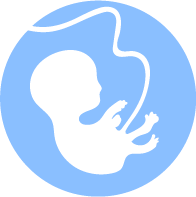Prenatal diagnosis refers to all the tests that take place during pregnancy, in order to uncover serious, mainly genetic disorders, in the fetus, occurring with an overall frequency of about 1/20 pregnancies. Prenatal testing includes:
- monitoring the proper progression of pregnancy in terms of the mother and the fetus and undertaking the necessary tests for this purpose
- diagnosis of serious malformations of the fetus with the aid of ultrasound
- risk assessment for possible genetic defects, mainly chromosomal abnormalities, such as Down syndrome, especially in the 1st trimester of pregnancy, through the combined use of sonographic markers, such as nuchal translucency – NT and biochemical markers in maternal blood (PAPP-a and β-hCG in the 1st trimester)
- diagnosis of chromosomal abnormalities, such as Down syndrome and other chromosomal abnormalities
- diagnosis of genetic diseases due to gene mutations, by direct analysis of fetal genetic material
